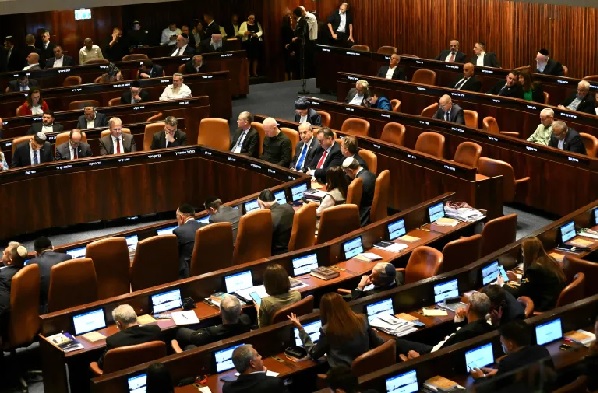The Israeli parliament has given its final approval to controversial legislation that allows the government to deport the family members of so-called “terrorists”, including its own citizens, to the Gaza Strip and other locations.
As the bill cleared the two required final plenum readings on Thursday, lawmakers in the Knesset approved the law – which would apply to Palestinian citizens of Israel as well – by 61 votes in favour to 41 against.
Sponsored by Hanoch Milwidsky, a politician with Prime Minister Benjamin Netanyahu’s Likud party, the legislation gives the interior minister power to deport a first-degree relative of alleged attackers.
The parents, siblings or spouses of a so-called “terrorist” can be sent away from Israel in case they are deemed to have “expressed support or identification” or have failed to report information about “an act of terrorism or a terrorist organisation”.
Reporting from Amman, Jordan, Al Jazeera’s Nour Odeh said, “All Palestinian factions are labelled as terrorist organisations by Israel,” adding that “any expression of sympathy with the victims of the war in Gaza has been labelled as an expression of support for terror, especially in the past year.”
The law would also apply to residents of occupied East Jerusalem, but it was still unclear if it would apply in the occupied West Bank. Israeli citizens could be deported as well, but would retain their citizenship even after being expelled from the country.
Suspects will have the right to present a defence at hearings convened by the interior minister, who will have 14 days to make a decision and sign a deportation order.
The expelled people would be sent to Gaza or other destinations for between 7-15 years for citizens and 10-20 years for legal residents.
The law is likely to be challenged in court. Eran Shamir-Borer, a senior researcher at the Israel Democracy Institute and a former international law expert for the Israeli military, said that if the legislation reaches the Supreme Court, it is likely to be struck down based on previous Israeli cases regarding deportation.
“The bottom line is this is completely non-constitutional and a clear conflict to Israel’s core values,” Shamir-Borer told The Associated Press news agency.
In addition, a five-year temporary order was approved by a 53-41 vote allowing for prison sentences for minors under the age of 14 who were convicted of murder as part of an act of terrorism or as part of the activities of a terrorist organisation.
There were disagreements over the measure, with some lawmakers and Israeli legal authorities like the Attorney General’s office advocating for limiting the scope.
But proponents, chief among them far-right National Security Minister Itamar Ben-Gvir, passed the legislation while including all immediate family members.
The parliament has also given its final approval to a law granting the Ministry of Education the authority to fire, without notice, teachers who have identified with a “terrorist act”.
This was aimed at Palestinian schools in occupied East Jerusalem, as well as schools inside Israel run by Palestinian citizens of Israel, according to Al Jazeera’s Odeh, who said that “any expression of Palestinian identity, or support for Palestinian aspirations, any use of national symbols would be deemed in a very sweeping, very elastic notion of terrorism, those teachers would be sacked without prior notice”.
The Ministry of Education could also defund the schools, she added.
The Knesset is adopting an increasingly hardline approach, with the latest legislation coming days after lawmakers approved another law that banned the United Nations agency for Palestinian refugees (UNRWA).
Israel cut ties with the main agency delivering life-saving aid to millions of Palestinians across the region based on unsubstantiated claims that it harbours “terrorists” and works with Hamas and other groups against Israel.
Israel already arrests Palestinians under a quasi-judicial process known as “administrative detention”, under which they are initially jailed for six months and their detention can be repeatedly extended for an indefinite period without charge or trial.
Israeli military attacks since October 7, 2023, in Gaza have killed more than 43,000 Palestinians, with hundreds more killed in the occupied West Bank and more than 3,000 killed in Lebanon.

